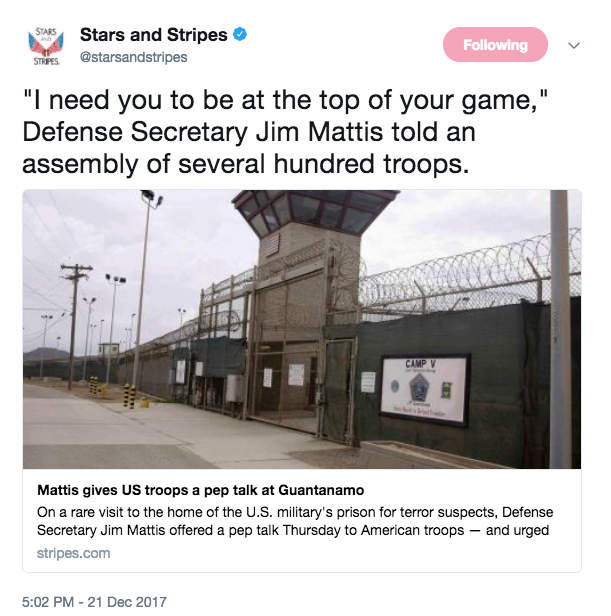Defense Secretary Jim Mattis on Thursday paid a surprise visit to Guantanamo Bay to visit U.S. troops there.
During a series of conversations with troops, the topic of North Korea was mentioned, the Associated Press reported.
Mattis continually said the U.S. would rather find a diplomatic solution for the Korean Peninsula, but that if the U.S. needs to take care of the situation militarily, “we expect to make it the worst day in North Korea’s life.”
And, if it comes to war, Mattis said “every submarine he’s [Kim Jong Un] got is to be sunk and every ship he’s got is to be sunk.”
Troops would need to be “at the top of your game,” Mattis told them.

Jim Mattis (Twitter)
Little progress has been made in the stand-off with North Korea that causes tensions to run high around the globe, as the country led by dictator Kim Jong Un continues to tout its missile program and threaten the Untied States with destruction. Diplomatic efforts to quell the threats and denuclearize North Korea have failed to move the needle on the situation’s urgency.
Kim Jong Un most recently promised to develop more nuclear weapons, this while touting his country’s latest intercontinental ballistic missile, the Hwasong-15.
Kim Jong Un said earlier this month that his scientists would continue making “more latest weapons and equipment” in order to “bolster up the nuclear force in quality and quantity,” North Korea’s state-run news agency said.
The Nov. 29 ICBM test was North Korea’s most powerful yet, and experts have speculated that the country might be able to reach the continental United States.
The ICBM was launched from Sain Ni and traveled more than 600 miles before crashing into the Sea of Japan, within Japan’s Exclusive Economic Zone (EEZ). The ICBM was in flight for more than 50 minutes.
The BBC reported that, based on its trajectory, the missile could have traveled more than 8,000 miles, which means it could reach “any part of the continental United States.”
“But it seems likely, the analysis adds, that the missile had a very light mock warhead, meaning it might lack the power to carry a nuclear payload, which is much heavier, over that distance,” the BBC pointed out. “North Korea, however, says the Hwasong-15 could reach mainland US carrying a ‘super-large heavy warhead.’”
The missile launch defied international sanctions on the country led by dictator Kim Jong Un, and it drew ire across the globe, as this was the highest missile North Korea has ever launched – reaching nearly 2,800 miles into space.
Mattis has said the missile test went “higher, frankly, than any previous shot they have taken,” and that North Korea can hit “everywhere in the world, basically.”
North Korea had not tested a missile in more than two months – odd, considering the regime led by dictator Kim Jong Un has conducted now-16 missile tests this year alone, and also launched a nuclear bomb.
North Korea in early September conducted its sixth ever successful nuclear missile launch and claims that the country now has a Hydrogen bomb it can place on an intercontinental ballistic missile (ICBM).
The most recent North Korean missile test was on Sept. 14, when North Korea launched an intermediate-range missile over Japan into the Pacific Ocean.
Mattis was the Pentagon chief who has gone to Guantanamo Bay in nearly 16 years, as Donald Rumsfeld was the last Defense Secretary to visit in Jan. 2002
Mattis visited American troops at the base but did not visit the detention center, which is also home to 41 prisoners. Rumsfeld visited Guantanamo shortly after the terrorist attacks of 9/11, as that was when the military prison was established, to hold suspected terrorists.



